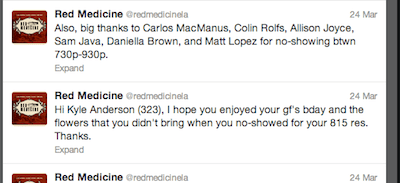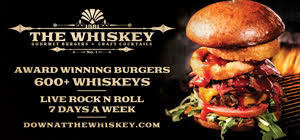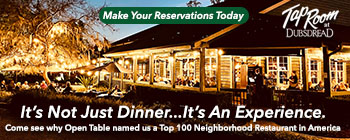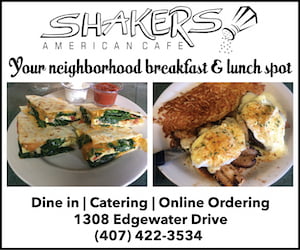
It’s no secret that no-shows are a bane to every restaurant that takes reservations. They mess things up for other guests, too, the ones who were turned away when they called to book a table because the restaurant was fully committed, or those who arrive as walk-ins, encouraged by the empty tables beyond the host stand, only to be told those tables are reserved. We’ve all fumed after waiting an hour or so for a table to open up or from our perch at the bar, the only dining option available, as we glanced at the still-empty tables being held for the supposed pre-booked parties.
The restaurateurs aren’t happy about it, either. They’ve calculated expenses, scheduled staff and ordered provisions based on their projections of the number of guests who will be coming in. To the restaurant owner, the chairs in the dining room are not just places for the guests to sit, they are revenue generators. Insiders sometimes refer to “butts in seats” as the multiplier for the average check figures. No shows mean one or more butts will not occupy those seats, and other butts were turned away.
So what can a restaurateur do?
Many options have been explored. Some simply take a phone number when a reservation is made in the hope that having that bit of identity connection will assure responsibility from the guest. We know that doesn’t work. Some popular restaurants, such as Emeril’s Orlando, require people who have made a reservation to call again, on the date they are to dine, to reconfirm the appointment. If no call is received, the hopeful diners are warned, the table will be given away. Other restaurants have a staff member call the guests the same day to verify
Victoria & Albert’s takes a credit card number at the time of the reservation and warns guests that no-shows will be charged. In Chicago, Grant Achatz’s Next does not take “reservations” but rather sells tickets to have dinner at the uber popular restaurant — full payment in advance, just as if one were buying a ticket to a concert or other event. Can’t go? Give the ticket away or sell it to someone else or take the loss. (By the way, I employ this method with my Supper Club and Pop-Up Dinner events.)
Now, in the age of social media, one restaurant owner in Los Angeles has decided to go the public humiliation route. As reported in this article on Huffington Post, Noah Ellis, co-owner of Red Medicine, is calling people out in Twitter posts when they don’t show up, naming the uncrossed-out names that are in the reservation book. Ellis is getting a lot of atta boys from other restaurateurs, but he’s also learning that those who live by the social media sword may also get poked by it. Following his tweets, according to the HuffPo piece, negative reviews about the restaurant began showing up on Yelp.
Attempts to shame or otherwise get revenge on no-showers aren’t new. I’ve been told — totally anecdotally — of owners who have called the number given at the time of the reservation at, say, 3 a.m. to express concern that something might have happened to the members of the party. Or ordering a pizza to be delivered to the home of the absentees, saying they must be hungry after skipping dinner.
Most, however, see those tactics as the slippery slopes they are.
What’s the solution? I don’t have one beyond the employment of mutual consideration. If guests can’t honor the commitment to dine at the restaurant, they should call the restaurant to say so, even it it’s 15 minutes beyond the reservation time. At least that party cooling its heels in the bar might get a table earlier. I find the “you must call the day of your reservation to confirm” tactic insulting. And I know that paying a staff member to make confirmation calls is not the best use of payroll dollars.
Common courtesy really is the answer. In other words, we’re doomed.
What do you think? Would the threat of public humiliation cause you to notify the restaurant if you’re unable to attend? And restaurateurs, what tactics have you tried — or considered — to put a stop to no-shows? Leave your comments below.
{jcomments on}










